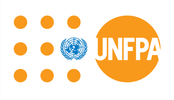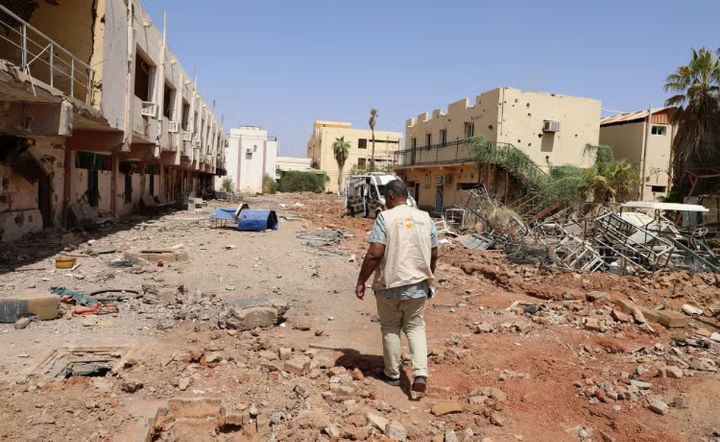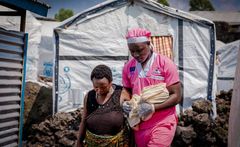
International humanitarian law flouted as health and aid workers are targeted in conflicts around the world
UNITED NATIONS, New York – Across the world, wars are being waged on the very systems set up to protect civilian populations: Health workers, hospitals, health centres and ambulances are being targeted in horrifying numbers.

Attacks against health facilities doubled between 2023 and 2024, and more than 900 health workers were killed last year. Humanitarian aid workers dedicated to supporting the most vulnerable in multiple crises were also killed in record numbers in 2024. Yet 2025 is outpacing even these dark statistics.
This comes at a moment when funding for humanitarian work is shrinking and support services established over decades are struggling to operate. UNFPA heard from health workers and patients coming under fire in maternity rooms, attacked while in transit to clinics – and from those still trying to save them.
An assault on Gaza’s health system
“Because the delivery room was under direct fire, I delivered babies in hospital hallways,” Ayda, a senior midwife in northern Gaza, told UNFPA. Despite relentless airstrikes and repeated displacements, Gaza’s midwives continue to support mothers and newborns – often while grieving their own families.
Movement restrictions and a prolonged lack of fuel and electricity have also made it more difficult to help those most at risk. “For lights, we used mobile phones,” said Ayda. “Despite the lack of supplies and water, our hands continued to work. Life must continue even when bombs are going off.”
The war has devastated Gaza’s health system and left tens of thousands without access to essential reproductive health services, including family planning, antenatal care, safe delivery care and emergency obstetric treatment.
Now, as famine takes hold, miscarriages, premature births and low birth weight cases have surged, while newborn deaths – including on the first day of life – are increasing.
Since October 2023, the World Health Organization (WHO) has documented over 720 attacks on healthcare in Gaza, with at least 1,580 health workers killed and as yet unknown numbers arrested and detained by Israel. Among them was Ayda, who just days after sharing her story, was tragically killed in an airstrike along with 37 members of her family.
Delivering amid devastation in Sudan
“I performed my first surgery here, delivered my first baby here,” said Dr. Khalid Badreldin, a reproductive health analyst with UNFPA in Sudan, in a field of rubble that used to be part of the Ibrahim Malik Hospital in Khartoum “Now I find it like this.”
The hospital was a major provider of critical maternal and neonatal services and emergency treatment, but it has sustained such severe damage that it has been completely shut down. Over 80 per cent of health facilities in conflict zones of Sudan are now non-operational.
Even so, UNFPA has continued delivering essential health and protection services for women and girls – with midwives, health workers and outreach teams putting their lives in danger to care for the most vulnerable.
“Midwives in Khartoum were taking huge risks to reach women in their homes,” explained Hawaa Ismael, a midwife at the UNFPA-supported Kararai Health Centre in Khartoum. “It was exhausting, working day and night, but it’s our duty, and I’m proud of what we’ve done.”
At Al Dayat Hospital in Khartoum, midwife Batoul* added, “All the sexual violence cases were brought here. We were constantly under shelling and mortar fire, but we never stopped working.”
On the other side of the country, staff at the UNFPA-supported El Fasher Maternity Hospital have come under attack: One midwife was killed when her home was shelled on Thursday, and another has been kidnapped.
A spiralling health crisis in Haiti
Health clinics and hospitals have been deliberately targeted in the crisis that has gripped Haiti over the past 18 months, which has further weakened a health system already on its knees after years of crisis, conflict, looting and financial collapse.
UNFPA staff report that Haiti’s largest health centre, the State University Hospital, was attacked at its reopening ceremony in December 2024, following a 10-month closure, with several people killed. In the same month, armed gangs set fire to the Bernard Mevs hospital in Port-au-Prince, damaging the operating room, the pediatrics ward, the imaging room and laboratories. Coordinated gang attacks also forced the closure of Mirebalais University Hospital in April 2025.
Organized gangs are waging a brutal campaign to seize control of the capital, with sexual violence rampant. An estimated 1.2 million women and girls are in urgent need of protection against gender-based violence, but due to ongoing violence three out of UNFPA’s four safe spaces in the Port-au-Prince area were recently forced to close and relocate. As access to emergency services remains extremely limited, just one quarter of rape survivors receive care within the critical 72-hour period.
A heavy mental toll in Ukraine
For women and girls across Ukraine, the stress of war is never far. Anastasiia is from Sloviansk, in the front-line Donetsk region. She travelled some 20 km to reach the Kharkiv Regional Perinatal Centre as her due date approached.
“The doctors explained that our region doesn’t have a neonatal intensive care unit. They could perform a Caesarean section and begin treatment, but if complications developed, they wouldn’t be able to provide full care,” she told UNFPA, which supports the centre.
Kharkiv is regularly subjected to bombings, drone strikes and artillery shelling, with residents forced to evacuate. Since January 2025, the WHO has recorded over 300 attacks by the Russian Federation on healthcare facilities, services and personnel in Ukraine; women and girls in particular are often compelled to find safer places to shelter and to give birth.
“Every day brings stress,” said Anastasiia. “Even if there’s no immediate strike, the fighting nearby is loud and constant… I was afraid to give birth, but life goes on – we want to live too.”
Response workers in conflict settings are often at risk of coming under fire themselves. “When we arrive at the sites of attacks or in cases of violence, we don’t have time to slow down,” explained Roman, who works with a UNFPA mobile psychosocial support team in Dnipro. “It’s like our own reactions are on hold. Only later, when we look back and discuss it, do we realize how difficult it actually was.”
Birth under fire in the Democratic Republic of the Congo
In the eastern Democratic Republic of the Congo, most facilities providing maternal healthcare have been bombed or looted, including a UNFPA warehouse storing essentials such as reproductive health kits, delivery kits, contraceptives, medicines, beds and tents.
In the Rutshuru territory of North Kivu province, UNFPA spoke to Ms. Toyata, who had been displaced since February 2023. While heavily pregnant, she had recently travelled through darkness and chaos with her mother to reach a UNFPA-supported mobile health clinic to give birth.
As just one third of hospitals in the region and one in five health centres are able to function, UNFPA’s mobile health teams are often the only option women have. “It is for women like Francine that we do this work,” said her midwife, Nelly. “We were not safe. We need more support to meet these urgent needs.”
As the conflict escalates, bombs have started hitting camps for internally displaced people, and UNFPA-supported mobile health clinics and listening centres have also been looted and destroyed. This has forced them to temporarily suspend services, further reducing the options available to people in dire need of them.
A call to act for humanity
The bravery and dedication shown by the women and men who put their lives at risk to save others deserves every effort to protect them from harm. On World Humanitarian Day, UNFPA’s message to leaders is to put an end to the violence, to act for humanity to stop the impunity, and to fully commit to guaranteeing healthcare as a human right – including in the midst of war.
Contacts
Emmi Kallio-SponholtzUNFPA Nordic Representation Office
Tel:+45 26 77 66 58kallio@unfpa.orgImages

About UNFPA:
UNFPA is the United Nations sexual and reproductive health agency. UNFPA’s mission is to deliver a world where every pregnancy is wanted, every childbirth is safe and every young person’s potential is fulfilled. UNFPA calls for the realization of reproductive rights for all and supports access to a wide range of sexual and reproductive health services, including voluntary family planning, quality maternal health care and comprehensive sexuality education.
Subscribe to releases from UNFPA
Subscribe to all the latest releases from UNFPA by registering your e-mail address below. You can unsubscribe at any time.
Latest releases from UNFPA
Internationella klimakteriedagen: Dags för jämställdhet och rättvisa för kvinnors hälsa17.10.2025 13:23:09 CEST | Nyhed
Menopaus påverkar hälften av världens befolkning, och andelen av kvinnor som genomgått menopaus växer. År 2050 förväntas kvinnor över 50 år utgöra cirka 35 procent av den globala befolkningen tack vare förbättrad hälsa, livsstil och ökad livslängd världen över. Ändå är menopaus ett av de mest förbisedda områdena inom kvinnors hälsa på grund av tabun, stigma och missuppfattningar. Den internationella klimakteriedagen markeras den 18 oktober.
“I had no choice but to deliver my own baby”: Health workers in Gaza city describe impossible conditions2.10.2025 14:25:10 CEST | News
GAZA STRIP, Occupied Palestinian Territory – “The labour pains hit me at 4 am, but there was no one to help,” said Yasmeen, a midwife in Gaza city. “I felt it might end with my death, and the death of my unborn baby.” Her husband rushed out to seek help, but no ambulance was available and no one else could get them to a hospital. Yasmeen braced herself for delivery. “I asked my children to put a mattress on the floor. I had no painkillers. But I had no choice but to deliver my own baby.”
Afgørende at investere i kvinders og pigers rettigheder og valgmuligheder, herunder adgang til prævention26.9.2025 08:35:31 CEST | Pressemeddelelse
Reproduktiv handlefrihed - altså muligheden for selv at bestemme om og hvornår man vil have børn - er en grundlæggende menneskerettighed. Men for millioner af mennesker er denne rettighed stadig ikke opfyldt. Over hele verden oplever mennesker ikke planlagte graviditeter eller er ude af stand til at få de børn, de ønsker, hvilket har betydelig indvirkning på deres fysiske og mentale helbred.
En kvinde med et mål: Seksualundervisning til unge i Mexico City12.9.2025 08:34:31 CEST | Nyhed
MEXICO CITY, Mexico – “Mit mål er, at flest mulige unge mennesker i Mexico City får god seksualundervisning,” siger Rocío Ordóñez Pedraza. Den 32-årige psykolog og meningsdanner arbejder for Mexico Vivo Foundation. Pedraza er fast besluttet på at bryde tabuer og stigmatisering omkring seksualundervisning, især i mere konservative lokalsamfund, hvor der sjældent tales om disse emner.
Hungersnød bekræftet i Gaza – gravide kvinder og nyfødte i akut fare29.8.2025 11:36:54 CEST | Nyhed
GAZA-STRIBEN, De Besatte Palæstinensiske Områder – ”Hvor er verden, når den ser, hvad der sker med os og vores børn? Alle familier i verden har børn,” siger Inas, der bor i en flygtningelejr med sine tre børn i Gaza-byen – hvor det nu for første gang er bekræftet, at der er hungersnød. ”Ville de acceptere, at deres børn vågnede sultne op?”